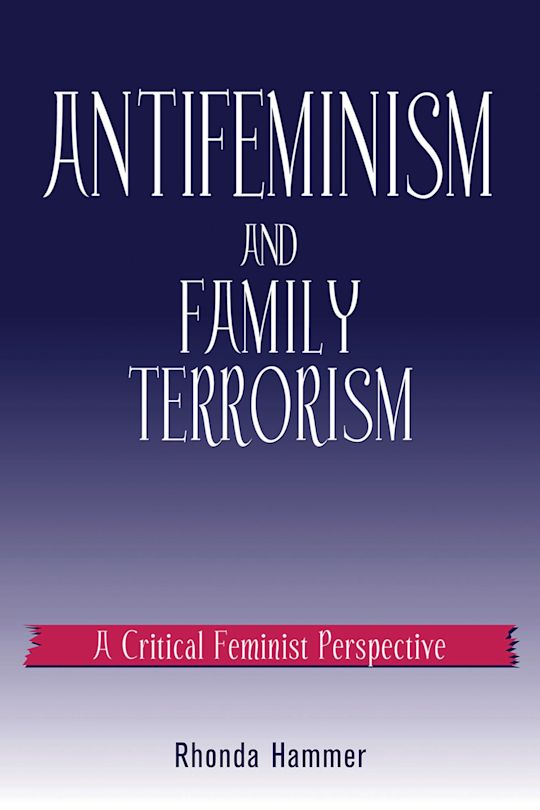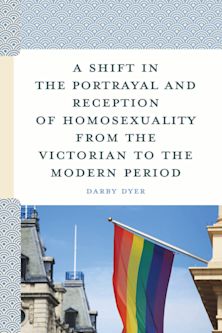- Home
- ACADEMIC
- Literary Studies
- Literary Studies - Other
- Antifeminism and Family Terrorism
For information on how we process your data, read our Privacy Policy
Thank you. We will email you when this book is available to order
You must sign in to add this item to your wishlist. Please sign in or create an account
Description
Rhonda Hammer's Antifeminism and Family Terrorism presents provocative critical feminist perspectives on violence against women and children. Hammer provides insightful analyses of the current rhetoric produced by antifeminists who would deny the seriousness of the problem and thus undercut important feminist concerns. Responding to the ongoing backlash against feminism and feminist impersonators like Camille Paglia and Christina Hoff Sommers, Hammer documents the tragic dimensions of the brutalization of women and children in the family, and the larger problem of the increasing poverty and oppression of women and children in the global economy. It is within this context that Hammer also critiques those mainstream feminist approaches that personalize, psychologize, and/or depoliticize what she calls 'family terrorism.' This concept articulates the familial, societal, political, economic, and now global dimensions of violence against women and children. The book demonstrates the need for a critical and dialectical approach that draws upon colonization theory and Borderland feminism to help develop a transformative feminist theory and practice.
Table of Contents
Chapter 2 Antifeminism, Postfeminism, and the Backlash
Chapter 3 Culture Wars over Feminism: Paglia, Wolf, and Hoff Sommers
Chapter 4 The F-Word and the Victimization Debate
Chapter 5 Family Terrorism
Chapter 6 Colonization, Dialectics, and Borderland Feminism
Chapter 7 Bibliography
Chapter 8 Index
Product details
| Published | 20 Dec 2001 |
|---|---|
| Format | Ebook (Epub & Mobi) |
| Edition | 1st |
| Extent | 224 |
| ISBN | 9780742599451 |
| Imprint | Rowman & Littlefield Publishers |
| Series | Culture and Politics Series |
| Publisher | Bloomsbury Publishing |
About the contributors
Reviews
-
By shedding light on the links between local and global violence against women and children as part of a colonizing system of family terrorism, Hammer prepares the ground for a transformative feminism in an era of globalization.
Lee Quinby, Macaulay Honors College, CUNY
-
In this serious and engaging work, Rhonda Hammer offers sharp analysis and progressive politics to provide an important contribution to antiterror critiques and initiatives.
Joy James, editor, The New Abolitionists
-
Hammer has done feminists an important service by providing this sustained analysis of antifeminism.
American Journal of Sociology
-
In this explosive book, Rhonda Hammer exposes what she calls 'antifeminist pseudofeminists' and 'feminist impersonators' like Camille Paglia, Christina Hoff Sommers, Katie Roiphe, and Naomi Wolf as collaborators with the colonialization of women worldwide. She powerfully argues that 'power feminism' and 'life-style feminism' are part and parcel of the very global consumer culture through which so many women are oppressed. When girl-power becomes nothing more than an excuse to shop and indulge one's urgesby exploiting others, Hammer rightfully claims that it is out of line with a feminist activism that aims to redress exploitation on a global scale. Hammer also interrogates the notion of domestic violence and fake-feminist responses to it. She develops the notion of 'family terrorism' in order to insist on, rather than diminish, the severity of violence against women and children. She argues that calling it domestic violence makes it a special kind of violence that is not taken quite as seriously or considered quite as violent as other kinds of violence. Indeed, in the last chapter of her book, Hammer persuasively makes the connection between colonization, global capitalism and poverty, and the prevalence of family violence. Hammer's book is the first
Kelly Oliver, SUNY, Stony Brook
-
In this explosive book, Rhonda Hammer exposes what she calls 'antifeminist pseudofeminists' and 'feminist impersonators' like Camille Paglia, Christina Hoff Sommers, Katie Roiphe, and Naomi Wolf as collaborators with the colonialization of women worldwide. She powerfully argues that 'power feminism' and 'life-style feminism' are part and parcel of the very global consumer culture through which so many women are oppressed. When girl-power becomes nothing more than an excuse to shop and indulge one's urges by exploiting others, Hammer rightfully claims that it is out of line with a feminist activism that aims to redress exploitation on a global scale. Hammer also interrogates the notion of domestic violence and fake-feminist responses to it. She develops the notion of 'family terrorism' in order to insist on, rather than diminish, the severity of violence against women and children. She argues that calling it domestic violence makes it a special kind of violence that is not taken quite as seriously or considered quite as violent as other kinds of violence. Indeed, in the last chapter of her book, Hammer persuasively makes the connection between colonization, global capitalism and poverty, and the prevalence of family violence.
Hammer's book is the first sustained analysis of the popularization of a certain conservative feminism, or pseudofeminism, that creates intellectual celebrities but does not address the real problems that women continue to face. Her discussion of the role of the media in the creation of feminist celebrities that appeal to young women is brilliant. Hammer's one-two punch will have many feminist scholars and activists cheering that finally someone has taken the time to meticulously expose conservative feminism as a self-serving opportunistic media fad that not only covers over the real-world exploitation of women but also collaborates with that exploitation!Kelly Oliver, SUNY, Stony Brook



































